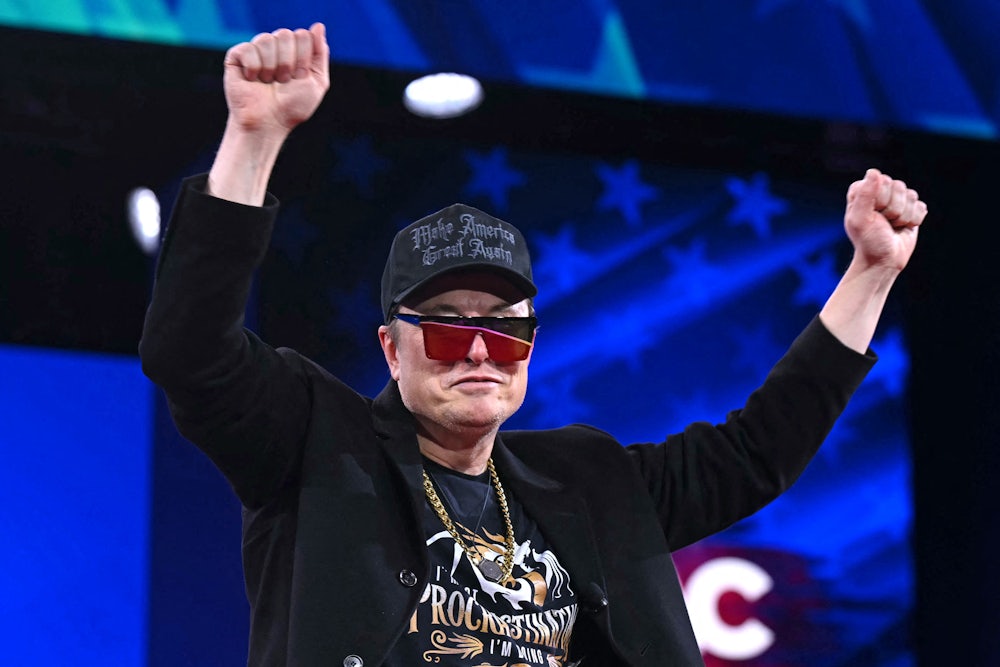Ever since Donald Trump and Elon Musk began downsizing the U.S. Agency for International Development, the administration has claimed that aid for lifesaving humanitarian assistance would continue. This notion has helped sustain the idea that the dismantling of USAID is merely about tackling governmental waste and fraud—after all, if the most critical assistance is continuing, then perhaps what is being targeted really is superfluous spending, as Musk and Trump claim.
But now the delivery of therapeutic food assistance to nearly 400,000 severely malnourished children abroad is in doubt due to ongoing firings at USAID, two manufacturers of this product told me in interviews. The raw materials needed to make the product are sitting in warehouses, but the manufacturers say they’re uncertain whether to proceed because they don’t know if the U.S. government still wants to buy the product—and they can’t be certain it will be shipped.
The product in question is called Ready to Use Therapeutic Food, or RUTF, a sterile, bureaucratic name that masks the horrific nature of its lifesaving function. It is a sweet paste largely made of peanuts, milk, and vitamins. It’s designed for safe ingestion by young children inflicted with what’s known as “severe wasting,” meaning they’re suffering extreme, acute malnutrition or hovering on the edge of starving to death. It’s packaged in foil packets that don’t need refrigeration, making it suitable for delivery to areas inflicted by extreme deprivation.
“It’s the only treatment that can cure a severely malnourished child,” says Navyn Salem, the founder and CEO of Edesia Nutrition, which manufactures the product in Rhode Island.
As it happens, enormous amounts of this lifesaving paste are produced in two American factories: In addition to the Edesia facility in Rhode Island, another organization called Mana pumps out the product in Georgia. USAID has been contracting with the two operations—both nonprofits—to send it to the world’s starving children, mostly in Africa, for over 15 years. Both have current contracts with USAID, signed during the last administration, to treat a total of 1.2 million children for seven weeks, between the two companies, which would mean full rehabilitation from severe malnutrition for those children.
But the latest round of cutbacks at USAID has left these operations flummoxed and frustrated. As part of its current contract, Edesia has enough raw ingredients left in its warehouses to manufacture the paste for 160,000 children, Salem says. The company hasn’t decided whether to complete it because the removals at USAID have put on paid leave the employees who oversee her contracts, Salem notes, and she can’t get clarity from USAID about whether the food will be either paid for or shipped.
“Starving children are waiting for this product to arrive,” Salem said.
Meanwhile, the Georgia-based nonprofit Mana Nutrition has enough ingredients to manufacture the product for around 200,000 badly malnourished children, pursuant to its contract, according to its co-founder and CEO, Mark Moore. He cannot figure out who at USAID is now overseeing or processing the contract, or get confirmation that USAID wants it completed.
“We are stacking it up in a warehouse,” Moore told me. “We have no assurance whether it will be shipped or paid for.” Moore added: “For sure, it’s in doubt.”
This was supposed to be sorted out by now. Earlier this month, when firings first started to hit USAID, both companies were initially given stop-work orders, but then the administration lifted them. With Secretary of State Marco Rubio promising not to hamper the most desperately needed aid, it appeared that the paste would keep being shipped.
This week, however, both companies have discovered that this promise is in question. The firings have largely led to USAID’s system for paying contractors breaking down, and have emptied the agency of people who had overseen the contracts, with no indication of who’s supposed to be replacing them, the two CEOs said.
“The system is in such turmoil at this point that everything is in question,” Moore told me. In an echo of Musk’s recent claim that he and Trump are “feeding USAID into the wood chipper,” Moore added: “So many people went into the wood chipper that there’s nobody to man the farm.”
This week, The New York Times reported that thousands more USAID employees have been fired. Though lifesaving assistance is supposed to continue, the Times report noted that the firings had crippled the agency’s payment systems, hobbling many of those programs. Some foreign aid payments are supposed to resume after a 90-day review, but there’s no indication that there’s a system in place to oversee that, the Times noted.
All this has been the experience of these two nonprofits, and that experience illustrates the consequences of all these Trump-Musk-fueled firings. “Kids are waiting for us to act,” Moore said.
It is possible that the Trump administration’s version of USAID—or what’s left of it—will resolve this situation and send assurances that this assistance will be paid for and shipped. But even if so, this turn in the saga badly undermines the notion that Trump and Musk are actually achieving genuine efficiencies.
After all, the confusion we’re seeing clearly constitutes absolutely awful management. Surely it should have been possible to undertake examinations of USAID’s programs without leaving the fate of such critical assistance in limbo.
Crucially, Salem argues that this sort of humanitarian assistance should be in keeping with Trump-Musk’s stated objectives. She notes that feeding the hungry abroad bolsters national security at home and discourages migration to the United States. And she says there absolutely are ways to make the system for delivering aid far more efficient—as Musk says he wants. Indeed, she has ideas on how to do this that would save more taxpayer money and further advance American interests.
“We do fit with everything that is aligned with the current administration,” Salem says.
This product is made in America—in factories that sit in a deep-red area in Georgia and a deep-blue area in Rhode Island. It’s made with peanuts grown mostly in the South and dairy produced in the Northeast and Midwest. It’s made by American workers, then hauled by them to American ports, where it gets loaded onto cargo ships, so our American plenty can feed those abroad who do not enjoy the bounty that we do.
Every packet of RUTF manufactured in the Rhode Island facility reads: “From the American people.” Those abroad who see this and benefit, Salem notes, will be inculcated with “American values and goodwill.” Achieving this is highly cost effective—we spend a tiny fraction of the national budget on foreign aid to begin with. These treatments cost a pittance, but each one saves a child’s life. Put all these accomplishments together, and compare them to their cost, and you might even call it “efficiency.”






